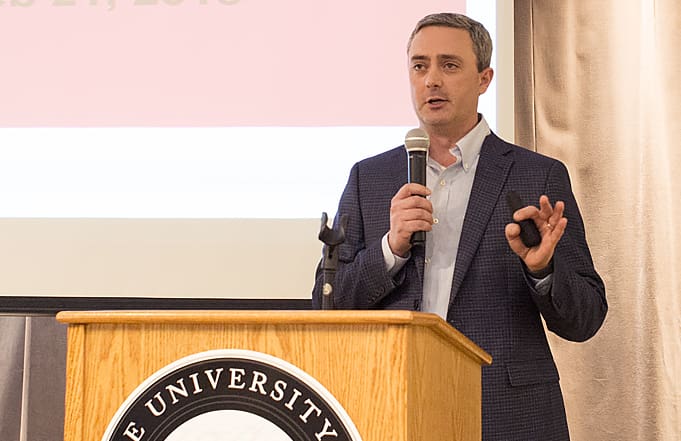March 6, 2018
Kolby Malesich, Business Analyst with Cargill U.S. Feed & Nutrition, visited the Montana Western campus on Feb. 21, 2018 to present as part of the “Bridges to Business” series, sponsored by Helix Business Solutions. The series aims to bridge communication and collaboration between the University and the Dillon community.

Helix Business Solutions, a local technology company that employs several Montana Western alumni, has partnered with the Montana Western Business Department. The goal of the partnership is to bring industry leaders to the UMW campus to share insights and experiences in their industries with the campus, community and students from area high schools.
“Helix is proud to be partnering with Montana Western,” shared Kevin Sherwood, CEO of Helix Business Solutions. “We are excited about the impact this program will have on our community. We have strengthened our company by hiring Montana Western alumni and are invested in providing future UMW graduates and the community this level of exposure to the exciting innovations happening with some of the biggest brands in business today.”
Malesich’s presentation focused on the growing importance of technology in the agricultural industry. He grew up on a farm in Dillon, Mont., and graduated from Colorado State with a degree in Ag Business.
Malesich said his “last interview was 20 years ago,” when he received an internship opportunity with Cargill who he has worked for ever since.
Cargill is the largest private company in the United States, employing 155,000 people. They service many industries, but Malesich’s work is focused on their animal feed products.
He works remotely from Dillon as a Business Analyst, pouring over mountains of data to help increase the company’s efficiency.
Malesich’s talk was mainly concerned with population increase; it is expected that there will be 30-40% more people living on the planet by 2050. According to his analysis, this means 50-100% more food than is currently available will need to be produced in the next 30 years.
He cited several factors that make this a challenging proposition. They included: limited land, water limitations, environmental concerns about fertilizer and pesticides, labor issues, and changing consumer preferences.
Thankfully, Malesich believes advances in technology will allow companies like Cargill to meet the growing demand for increased food production.
He then highlighted several exciting new technological advancements designed to increase yields, eliminate waste, and produce healthier food.
Drones and satellites now allow farmers to create detailed maps of their crops, and pinpoint with great accuracy where and where not to spray pesticides.
Advancements in robotics and artificial intelligence have created automated weed-pickers that can differentiate between weeds and healthy crops with a program similar to facial recognition software.
iQuatic is a product created by Cargill that uses acoustic tech to detect when shrimp are eating to prevent feed from going to waste in aquatic farms.
He concluded his presentation by urging the students and agricultural business owners in attendance to stay well-informed on the rapid advancements in technology.
“Change is coming. You have to embrace technology, because your competitors will.”
For more information on the “Bridges to Business” series, please contact Professor Fred Chilson by email at [email protected], or call 406-683-7178.